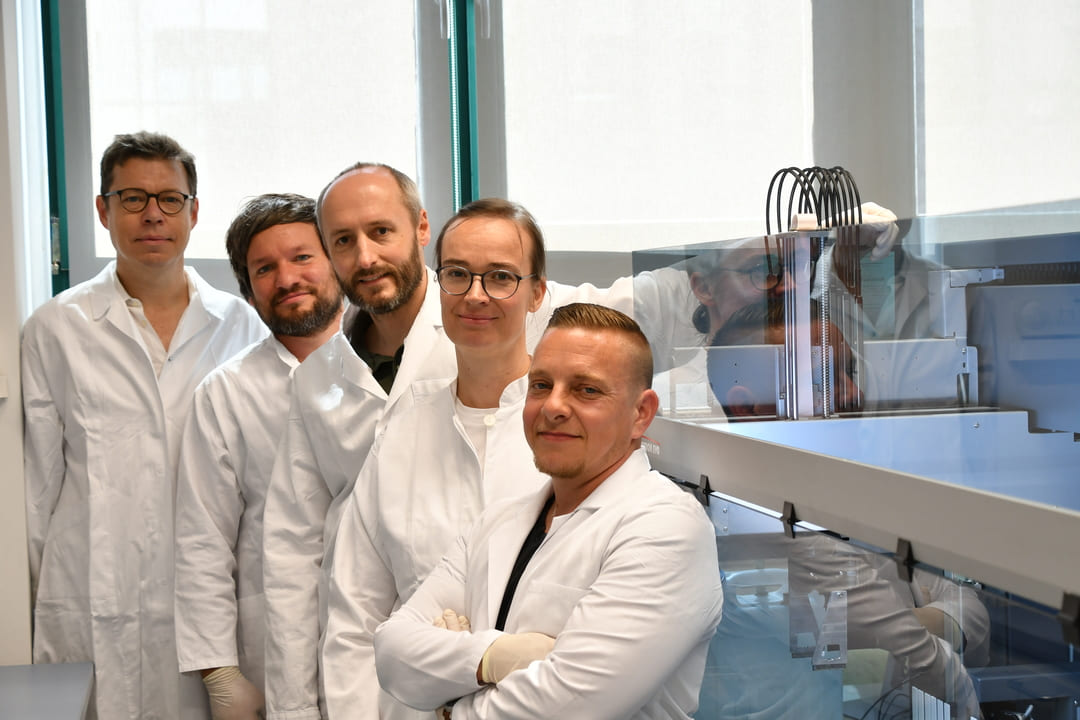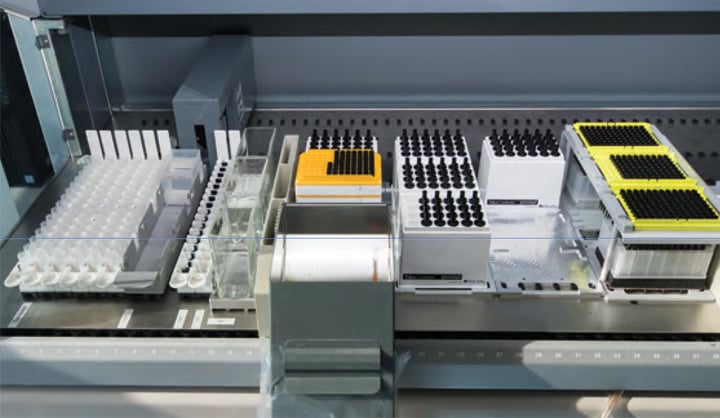Liquid biopsies offer the potential for the minimally-invasive detection of a growing number of cancers. Epigenomics is using its expertise in epigenetics to develop rapid tests for blood-borne cancer biomarkers, based on the unique DNA methylation fingerprint of cancerous cells.
DNA methylation is the process by which methyl groups are added to cellular DNA, and it plays a key role in gene regulation throughout the lifecycle of cells. Aberrant methylation of cytosine bases has been implicated in the pathogenesis of many genetic
diseases – particularly cancers – disrupting the normal gene regulation and cell proliferation. The unique ‘fingerprints’ created by these anomalous methylation patterns provide potential biomarkers of carcinogenesis, which can be detected in cell-free DNA circulating in the
blood as part of a liquid biopsy. Epigenomics – which has sites in Berlin, Germany, and San Diego, California – has over 20 years of expertise in the development of DNA methylation-based in vitro diagnostic tools, and aims to become a global leader in blood-based cancer detection. Dr Gunter Weiss, Senior Vice President of Product Development at Epigenomics, explained the advantages of this approach compared to tissue biopsies: “The main benefit is that liquid biopsies are minimally invasive, requiring just a plasma sample from the patient. While cell- or tissue-based assays are still considered the gold standard for genotyping or diagnostic procedures, they require you to have access to the tumor. If this is not possible, or the patient is unwilling to undergo a biopsy procedure, then a liquid biopsy may be the only solution. This technique also has significant potential for ongoing patient monitoring. For example, after surgery, when the primary tumor is no longer in situ, a liquid biopsy can be used to detect any spread of the cancer.”
 Members of the Epigenomics team (left to right): Dr Gunter Weiss, Oliver Hasinger, Sebastian Rausch, Dr Anne Schlegel and Andreas Aurenz
Members of the Epigenomics team (left to right): Dr Gunter Weiss, Oliver Hasinger, Sebastian Rausch, Dr Anne Schlegel and Andreas Aurenz
Epigenomics’ approach relies on the use of ammonium bisulfite to convert the cytosine bases in denatured DNA to uracil. This conversion is blocked by the presence of methyl groups, so only unmethylated cytosines are affected, allowing methylation to be investigated by downstream applications such as PCR or NGS. “High volume DNA extraction and bisulfite conversion have been core competencies since the founding of the company,” commented Dr Anne Schlegel, Senior Manager, Product Development. “We see ourselves as a provider of enabling technologies, and our Epi BiSKit offers other laboratories the ability to prepare bisulfite-converted DNA consistently and robustly from liquid biopsy samples.”
 Epigenomics’ automated workflow requires integration of various labware formats and ancillary devices onto the workdeck
Epigenomics’ automated workflow requires integration of various labware formats and ancillary devices onto the workdeck
“Preparation of DNA for epigenetic analysis requires relatively large amounts of input material and is very time consuming,” Anne continued. “It takes almost a full day to prepare a full run of 16 samples manually. This has been our major challenge over the last decade, and we have had several requests from customer laboratories to provide an automated solution. This would not only free up hands-on technician time, it would also help to improve the reproducibility of the process by eliminating user-to-user variability and the risk of human error from the workflow.”
Epigenomics needed an automation partner capable of managing its complex and delicate sample preparation protocols. Sebastian Rausch, a Scientist at Epigenomics, described the start of the project: “We started by visiting different customer laboratories to see what equipment they were already using, but our previous positive experiences of using Tecan instruments meant that the company was definitely our first choice. Once we had made our decision, we worked closely with the Tecan team to set up our protocols on a Freedom EVO® 200 workstation, progressively optimizing the scripts and workdeck layout. The high input sample volume required for our assay – 3.5 ml of plasma – ruled out the use of regular SLAS-format 96-well plates, so we had to use high volume 24-well plates. Although these are twice the height of standard plates, the instrument’s Freedom EVOware® software makes it very easy to create new labware templates with different dimensions. However, this created our next challenge, as four 24-well plates would be needed to perform a full run of 96 samples, requiring four shakers to be running in parallel.”
“We also needed a fifth shaker, one with built-in heating, to perform the bisulfite conversion on the smaller volumes of eluted DNA in a 96-well plate,” Sebastian explained. “This conversion takes place under harsh chemical conditions and requires a constant 80 °C; too high and the DNA is destroyed, too low and the bisulfite conversion is inefficient. Our initial experiments highlighted that poor heat transfer between the heater and the plate surface led to very inconsistent heating, so we needed a solution that would improve this. We jointly found a form fitting adapter – something quite unique and special – to overcome this. Despite these challenges and the complexity of the workflow, we were able to publicly unveil our automated solution within a year of beginning the project.”
Despite these challenges and the complexity of the workflow, we were able to publicly unveil our automated solution within a year of beginning the project.
The outcome of this collaboration was an optimized and validated automated workflow with 87 major processing steps that takes 7.5 hours to extract 96 bisulfite converted samples, with equivalent results to manual processing. Epigenomics is confident that this automated protocol will help to open up the world of liquid biopsy testing to more laboratories, by removing the considerable manpower and technical barriers to adoption. Gunter commented: “This type of protocol will certainly be of interest to large reference labs already performing large numbers of assays. These facilities have very high throughput capabilities, and can help to drive further development of liquid biopsy testing in both cancer screening and other disease areas.”
To find out more about Tecan’s Freedom EVO workstation, visit www.tecan.com/freedomevo
To learn more about Epigenomics, go to www.epigenomics.com
Keywords:









